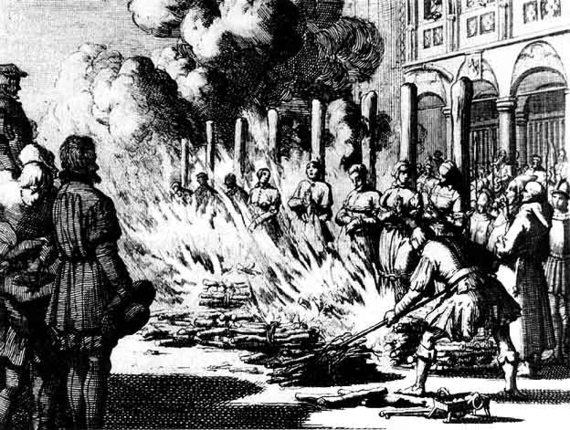Though Samhain was 11 days ago, I still have my Samhain ancestor altar up. Photos, candles, heirlooms, mementoes, wishes, letters, dreams and visions of ancestors met and unmet cluster at the center of my home. This year the cords are strong, and many days after Samhain I can still feel the ancestors' timeless spirits very near, vibrating and creating sweet light and wide perspective for me as I navigate the roughs and shallows of this complex and finite life.
This year, I added a special element to my meditations on the dead: remembrance of all those who have been tortured or killed as suspected witches or sorcerers, during the centuries of the Burning Times in Europe, in Salem, and in contemporary Kenya, India, the Congo, Papua New Guinea and elsewhere across the globe. "Witch hunts are an unfinished chapter of history," says Rune Blix Hagan, an historian at the University of Tromsoe in Norway. "It continues at full tilt, not in the West, but especially in Africa and also in Asia and South America."
Today's accused "witches" are almost all women, many of them the more outspoken, independent and prosperous women in their communities. Whether victims of simple sexist domination or scapegoats for the old ways in a modernizing society plagued with economic injustice, often they stand for a former way of life, a life more in harmony with nature. Their murder is thus a crime against women and nature, as well as a horrific violation of human rights and religious freedom generally.
As a witch, I am passionately committed to working on behalf of justice and safety for contemporary accused witches. And I am also committed to the equally important work of commemorating and remembering those already dead. Such remembrance is crucial for three reasons. It honors the dead. It helps protect against future injustice. And it helps today's witches -- and women in general -- to wake up to the living legacy of those events in our own psyches, a first step to healing and recovery.
In Europe, where my own ancestors lived, an estimated 50,000 to 400,000 or more -- almost all women -- were killed as witches between 1550 and 1650. The extent of the persecutions relative to the population of the continent at that time is staggering. Two German villages, for example, had only female survivor each by the time the Burning TImes, as witches often refer to those centuries, were over. As for the accused women who survived, they were often tortured, humiliated, raped, and had their breasts burned or sliced off.
Imagine growing up as a young girl and seeing the models of strong, independent women in your village being tortured and killed. Imagine absorbing the then widespread belief that women's sexual desire leads them to consort with the devil, and that female sexuality is the root of evil. Imagine learning to keep quiet, not to talk about your experiences, not to assert yourself sexually, not to amass too much property -- all for fear of your life. Such memories are part of all of our legacy, whether or not we had ancestors who were victims of the witch hunts.
Such a climate lasted for centuries, and it really wasn't that long ago. My 11th great-grandmother, for example, was imprisoned as a witch in Salem -- only eight generations before my grandmother lived. Those patterns of behavior have been handed down in our families from generation to generation. And though we may think those events are past and the memories long gone, as long as we don't make this legacy of sexism and oppression conscious, it continues to work inside us in ways we may not even recognize.
The message that women's empowerment -- sexually, financially and spiritually -- is evil and dangerous runs deep in us. The images, the sounds, the memories of the torture and the killings are lessons that many of us carry within our blood and our ancestral memories, telling us, for the sake of survival, to be quiet, to play it safe, not to claim our own deepest power.
The oppression of witches doesn't just affect those people tragically victimized in Africa, Asia and South America today. It continues to affect us all in contemporary Western nations as well. How important it is to remember -- so that we can, finally, start to forget.

